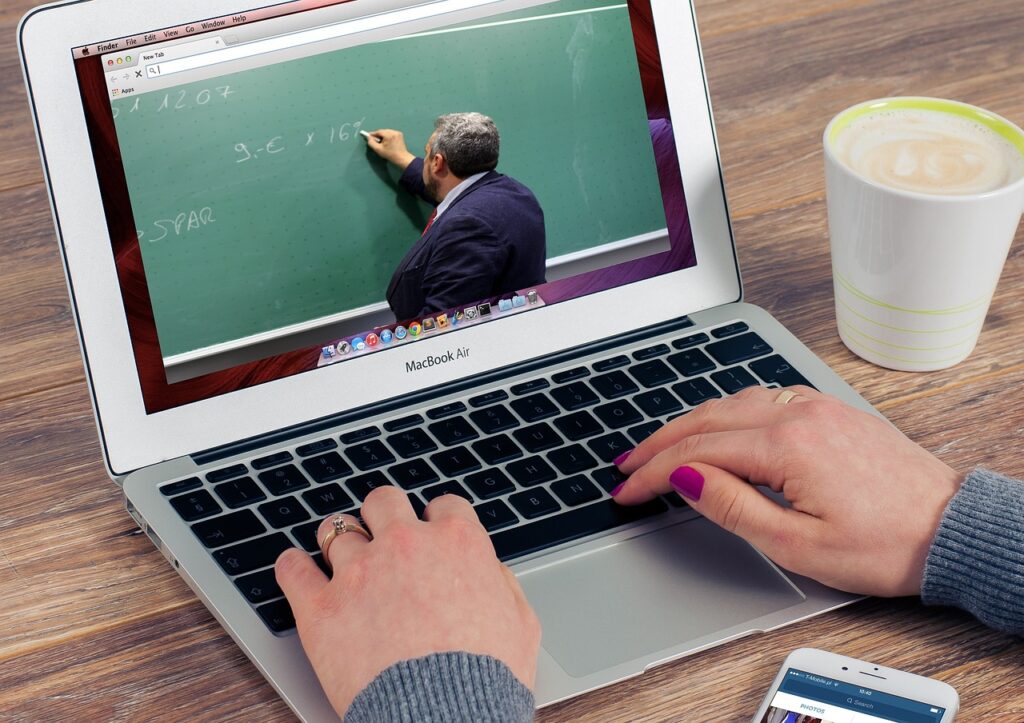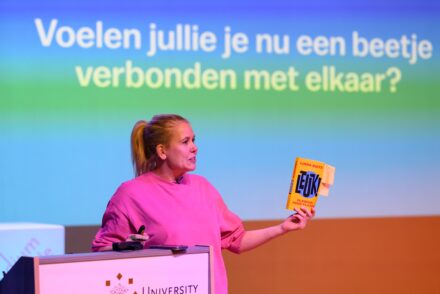Attending lectures on campus or at home behind the laptop? It does not matter for study results
Would you like to be present in the lecture hall in the old-fashioned way, or follow the lectures online at home? It does not matter for the study results, according to research by Radboud University and Tilburg University. However, there are some comments to be made.

These were strange times, the corona years, when schools closed, and teachers had to improvise to sell their lectures digitally. But they were also excellent conditions to produce innovative ideas and experiment with new forms of education to their heart’s content.
Koen van den Oever and Stephanie Koornneef, two young lecturers in Organization and Environment from the bachelor’s program in Business Administration at Radboud University, took the unique opportunity to test which form of education would yield better results. The classic lecture with physically present students or the digital version, live or afterwards.
Outcome
‘In general, the way lectures are followed up had no influence on student performance,’ says Van den Oever about the most striking conclusion of the study. ‘In any case, we cannot conclude that there is a difference.’ Watching live, at home or elsewhere, seems to work just as well as physically attending lectures.
The publication of the research in the peer-reviewed journal The International Journal of Management Education took some time, and Koen van den Oever now works as a lecturer at the economics faculty in Tilburg. That is why the results have only now been published, but that does not make them any less important or urgent, according to Van den Oever.
Back to the old
‘In the aftermath of the pandemic, schools and universities tended to continue teaching as before,’ explains Van den Oever. ‘The students had to go back to campus and live streams, or knowledge clips were made no more or much less.
‘We thought that was a great pity. We learned a lot from education during the lockdown period and now all that knowledge was thrown overboard again. We wanted to make a dissenting voice heard and we wanted to do that in a well-founded way.’
Representative
The researchers are the first to admit that this is an exploratory study. To demonstrate a causal relationship between teaching and study results, a different design is needed, for example in an experiment with a control group. But the results of an experiment are less easy to translate into practice.
And can you call the 161 respondents who actually contributed to the survey representative? It is a small sample. The research focused on a large lecture for bachelor’s students. ‘A limitation of this research is that the conclusions are based on one working method,’ Van den Oever admits bluntly. ‘But the sample is large enough for a significant statistical relationship.’
Own choice is important
‘We have gained a lot of new insights through this study,’ says Van den Oever. ‘Students could choose for themselves how they follow the lecture and also switch between those forms. We suspect that the ability to choose which mode best suits your learning style is particularly important for study results.
‘Because people learn in diverse ways. Some prefer to ask questions in class, others prefer to do it online, and still others prefer to rewind.’ A cautious conclusion is therefore that offering different forms of education can stimulate students, and that a one-sided offer actually depresses the results.
Attention span
‘I know from my own experience as a lecturer that there are often students at the back of the lecture hall who have trouble staying focused longer,’ says Van den Oever, ‘especially if the lecture is later in the day. They start talking to each other a bit more and that bothers the rest of the room. If that group stays away and follows the lecture online, it will be easier for the lecturer and the other students. Everyone benefits.’
‘I have been a teacher for about ten years now and I see the attention span of students is getting shorter and shorter. I think that this generation of students has become accustomed to faster presentations under the influence of social media. But that is an assumption,’ Van den Oever acknowledges, ‘so you could investigate that further.’
Feedback
A condition for a successful livestream is that students can give feedback in one way or another. You can raise your hand in a room, but in a livestream, it is more difficult. So, the teachers used online platforms and a chat function, which allowed students to actively respond to the lecture, through instant polls and multiple-choice questions.
Van den Oever: ‘In this way, a lecturer can still check whether the audience has understood the lecture a little. Although it does depend on the teacher’s dexterity with these online tools, whether the feedback is well organized.’
Social cohesion
The conclusions of this empirical research are not rock solid, but they can influence the debate about future forms of education. Van den Oever: ‘We have not yet had the intention of writing a policy document, but we are willing to think about the implications of our research for the organization of education.’
Van den Oever does have one piece of advice for policymakers. Record lectures. ‘Our findings argue in favor of including all forms of education, whether they are lectures or seminars. So that you can always choose which forms you are going to offer to whom.’






